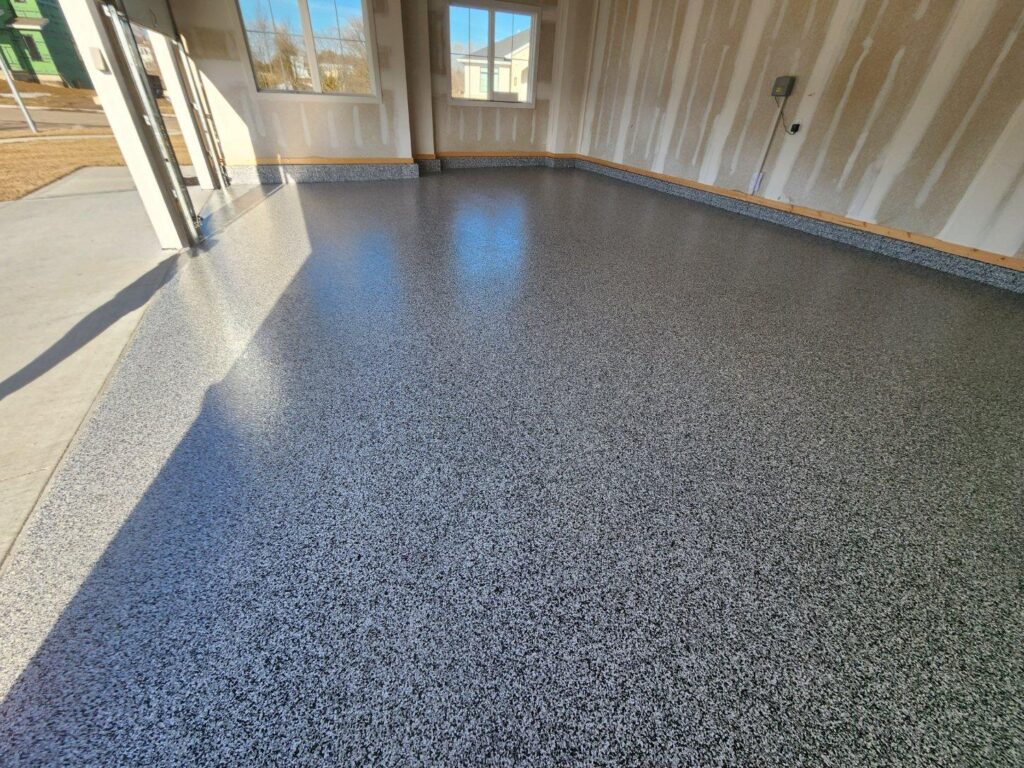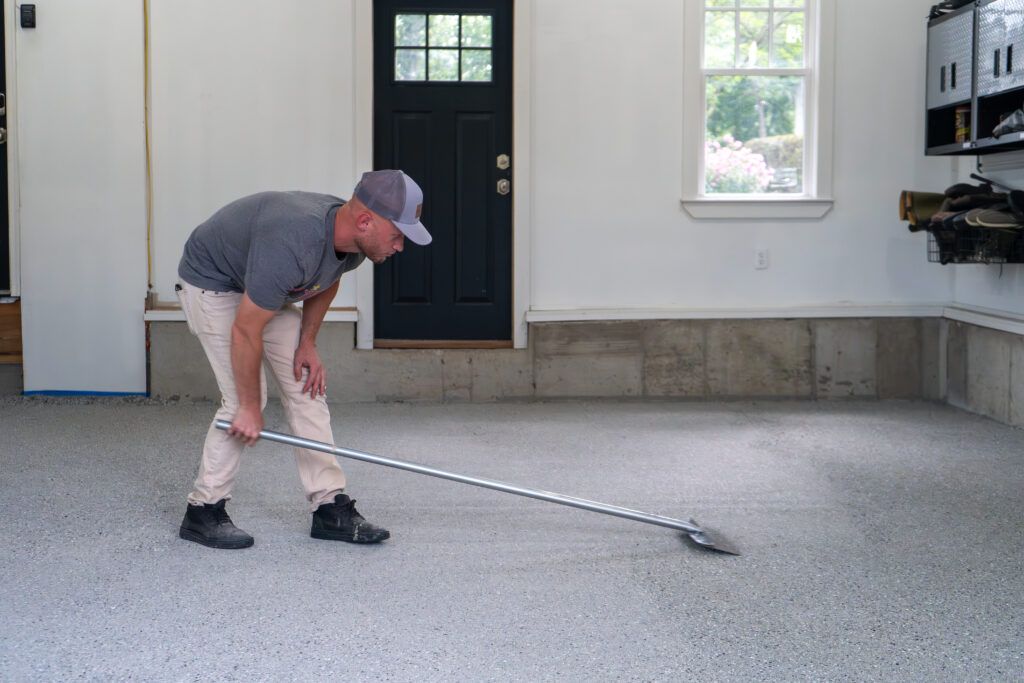Become an Installer

Lifespan, Cost, and Maintenance Tips
If you’re considering upgrading your garage, epoxy floor coatings are one of the most popular choices for durability, appearance, and ease of maintenance. But many homeowners and contractors ask the same question:
How long does an epoxy garage floor last?
The quick answer: Epoxy garage floors typically last 10–20 years in residential settings, and up to 30+ years when professionally installed and properly maintained. In heavy-use commercial or industrial settings, lifespan can be shorter (often 5–10 years) unless reinforced with high-performance topcoats.
In this guide, we’ll break down the real-world lifespan of epoxy, the factors that influence durability, DIY vs professional results, and how to extend the life of your garage floor coating.
Average Lifespan of an Epoxy Garage Floor

The longevity of epoxy depends on who installs it, the materials used, and how the garage is used. Here’s a breakdown:
- DIY epoxy kits (water-based): 2–5 years
- Professional 100% solids epoxy: 15–25 years
- Epoxy with polyaspartic/urethane topcoat: 20–30+ years
- Commercial/industrial use: 5–10 years (longer with pro installation & thick systems)
Comparison Table: Epoxy Lifespans
| Type of Epoxy Coating | Average Lifespan | Best Use Case |
|---|---|---|
| DIY water-based epoxy | 2–5 years | Light traffic, budget projects |
| Professional 100% solids epoxy | 15–25 years | Residential garages, workshops |
| Epoxy + polyaspartic/urethane topcoat | 20–30+ years | High-traffic garages, UV exposure |
| Commercial epoxy systems | 5–15 years | Warehouses, showrooms, shops |
Factors That Affect Epoxy Floor Longevity
Not every epoxy floor performs the same. These factors determine whether your coating lasts a few years or several decades:
Surface Preparation
The most common reason epoxy fails early is poor surface prep. Concrete must be diamond-ground or shot-blasted, tested for moisture, and repaired before coating. If skipped, peeling and delamination are inevitable.
Epoxy Quality
- Water-based epoxy (DIY kits): Easy to apply, but thin and weak.
- Solvent-based epoxy: More durable, but less environmentally friendly.
- 100% solids epoxy: Thick, industrial-grade strength that bonds tightly and resists heavy wear.
Topcoat Type
Epoxy alone is strong, but a polyaspartic or urethane topcoat dramatically increases lifespan by adding UV stability, abrasion resistance, and chemical protection.
Garage Conditions
- High humidity or moisture under the slab can shorten lifespan.
- Constant sunlight may yellow or fade epoxy without UV-stable coatings.
- Harsh winters with road salt and snowmelt can erode coatings if not cleaned.
Traffic Level
A residential garage with two cars will see far less wear than a busy warehouse or automotive shop. The heavier the use, the faster epoxy wears down.
Maintenance Habits
Basic cleaning, spill management, and occasional resealing can extend an epoxy floor’s life by 5–10 years.
DIY vs Professional Epoxy Garage Floors

One of the biggest factors in epoxy lifespan is whether you choose a DIY kit or hire a professional installer.
DIY Epoxy Kits
- Cost: $200–$600 for a two-car garage
- Thickness: Usually less than 4 mils
- Expected lifespan: 2–5 years
- Downsides: Thin coatings, poor adhesion, higher risk of peeling and hot-tire pickup
Professional Epoxy Installation
- Cost: $3–$7 per sq. ft. depending on system
- Thickness: 20–30 mils or more
- Expected lifespan: 15–25 years (30+ with polyaspartic topcoat)
- Benefits: Proper surface prep, industrial primers, moisture testing, and multi-layer systems
DIY is cheaper upfront, but professional epoxy lasts 3–5x longer and ultimately offers a better return on investment.
Maintenance Tips to Maximize Epoxy Lifespan
Epoxy is low-maintenance compared to bare concrete, but a few simple habits will help you get the longest life out of your floor:
- Sweep and mop regularly to remove grit that can scratch the surface.
- Use mats under heavy tools or vehicles to protect against gouges.
- Clean up spills promptly, especially oil, gas, or brake fluid.
- Avoid dragging sharp objects like metal stands or snow shovels.
- Reapply topcoat every 7–10 years if high-traffic wear is visible.
These steps can extend your epoxy floor’s lifespan by 5–10 years.
When to Replace or Recoat an Epoxy Garage Floor
Even the best epoxy floors eventually show signs of age. Watch for these indicators that it’s time to recoat or replace:
- Peeling or bubbling (poor adhesion or moisture issues)
- Yellowing or fading (UV exposure without UV-stable topcoat)
- Scratches or dull spots from years of use
- Hot-tire pickup where car tires lift the coating
If wear is minor, a recoating layer may restore protection. If delamination or widespread peeling occurs, full replacement is the better choice.
Alternatives to Epoxy (For Even Longer Lifespan)
Epoxy is excellent, but other resin-based systems may last even longer depending on your needs:
- Polyaspartic coatings: Cure quickly, UV-stable, last 20–30+ years.
- Polyurea coatings: Flexible, impact-resistant, popular in commercial settings.
- Polished concrete: No coating to peel, lasts 15–20 years with resealing.
If you’re looking for maximum durability and UV resistance, polyaspartic coatings often outperform standard epoxy.

FAQ: Epoxy Garage Floor Lifespan
10–20 years for residential garages, 20–30 years with professional installation, and 2–5 years for DIY kits.
Yes. Epoxy bonds to concrete and creates a hard shell, while paint usually chips and wears within 1–3 years.
With professional installation and proper care, some epoxy systems can last decades, but recoating may still be needed.
Poor surface preparation, moisture issues, or hot tires lifting weak coatings.
Polyaspartic coatings generally last longer, resist UV damage, and cure faster. Epoxy is a strong, budget-friendly choice.
Conclusion: The Real Lifespan of Epoxy Garage Floors
Epoxy garage floors are built to last, but the difference between a floor that fails in 3 years and one that lasts decades comes down to:
- Professional installation vs DIY kits
- Proper prep and quality materials
- Regular cleaning and maintenance
If you want the best return on investment, choose a professional-grade system with a durable topcoat. Done properly, your garage floor will not only look stunning but also perform for decades.

